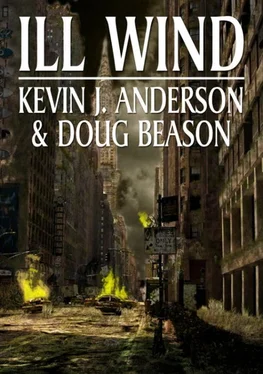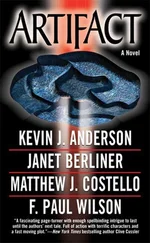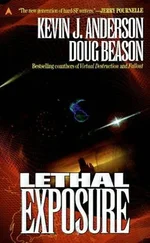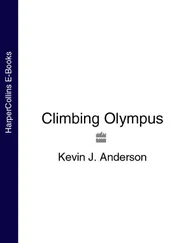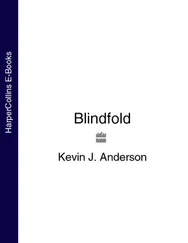Branson sighed. “Is a canned presentation really necessary? I get enough plastic flipped at me that I don’t believe my people can think for themselves anymore. Just talk to me and get it over with.”
Stone faltered, then flicked off the projector. “Of course.” He drew a breath. “In the Bioremediation section, we’ve been searching for a way to use natural microbes to break down substances in the environment, toxic wastes and so forth. Dr. Alex Kramer, here, and myself head up a team studying ways to break down long-chain polymers in landfills. You know, plastic garbage bags, beverage containers, styrofoam cups, and packaging. Waste products of such polymers deteriorate very slowly. We’re trying to find ways to get rid of it.”
“Excuse me!” Walter Pelcik said, raising his voice. His bushy brown beard stuck out in all directions. “We’ve got an oil spill to deal with here.”
Stone raised his voice a notch higher and continued without acknowledging the interruption, speaking directly to Branson, as if she was the only one who counted. Smart guy. But he had better get to the point in the next few seconds.
“As the first step, we developed an organism we called Prometheus. This little microbe has an appetite for octane—the eight-carbon molecule in gasoline… and crude oil.
“At the time, we didn’t see any use for it, but we applied for an FDA license just in case. Why would anyone want to decompose crude oil? Well, now it seems you might have a use for our little miracle.” Stone looked at the others. Dr. Kramer hovered beside him, fidgeting but not interrupting Stone. The conference room became quiet as the information sank in.
“Let me get this straight,” said Branson. An unexpected sensation twisted inside of her. Hope. “You’ve come up with some kind of germ that eats crude oil?”
“Not all of it,” Dr. Kramer answered, stepping forward, moving in front of Stone, “only the octane component and some of the ring hydrocarbons.”
Branson got right to the point. “So what does it leave behind? What kind of toxic mess are we going to have to deal with? Will we be in worse trouble than we are now, like with dispersants?”
“No.” Dr. Kramer shook his head vigorously. “Octane is just carbon atoms and hydrogen. When the Prometheus organism metabolizes the octane, it leaves behind CO2 and H2O, carbon dioxide and water, with maybe a little hydrogen sulfide—like rotten eggs—from sulfur contaminants in the mix. Nothing toxic whatsoever. It’ll work.”
Stone picked up the thread. “From our studies, we know that 25 percent of the Zoroaster crude is lightweight hydrocarbons that will evaporate off in a few days all by themselves. The rest of it, though, will be broken down slowly by photo-oxidation and natural microorganisms in the water. That part will take years.”
His eyes gleamed. “What we’re offering is a way to get rid of all the octane in the spill. That, plus the evaporation effects, will decrease the amount of visible oil on the Bay by something like 65 percent in a few days —and it will leave no pollution behind.”
Dr. Kramer cleared his throat. “We need to make clear, though, that Prometheus does not attack longer-chain hydrocarbons. That’s been our problem in fighting styrofoam and plastic waste. You’ll still be left with the tarry residue they keep showing on the news.”
Branson’s heart pounded, and a flush rose in her face. “But from the public’s point of view, over half the spill will disappear? That’s a dramatic and obvious effect.”
“You said you applied for an FDA license—why don’t you have it? And what if this microbe spreads?” Cochran said. “How are we going to get rid of it when we’re done?”
Dr. Kramer shook his head. He spoke confidently, as if daring them to disbelieve him. “That’s not unusual. It takes years for the FDA to process those things. Anyway, we should be able to get a waiver in an emergency. The other problem will take care of itself. These microorganisms are not indigenous to the area. We got them out of the ocean, near volcanic vents deep beneath the Gulf of Mexico. We crossbred them with some of the other oil-eating strains from samples along the beaches in Prince William Sound in Alaska. They’ll flourish for a while, feasting on the spilled crude oil, but they’ll die out quickly. They can’t handle this climate, and their food source will disappear as soon as the spill goes away. They can never become airborne.”
“We’ve demonstrated that several times in laboratory tests,” Stone added. “We can show you the reports. Dr. Kramer has all his lab books.”
“Well, we have to do something,” Branson said, tapping her nails on the table. She looked around the smoky room. “And this could look very, very good for Oilstar.”
“It’s not a cure-all,” Dr. Kramer said.
“We’re only interested in a short-term solution for now,” she retorted. “I need something spectacular to confirm that Oilstar is doing all it can. Once the press is satisfied, they’ll turn to some other problem.” She tapped a pencil on the table. “How soon can you have it? When can we try it?”
Stone flipped through viewgraphs to double-check information he should have known perfectly well—unless he was just putting on an act to appear overly conscientious. “Prometheus has been successfully tested. We got piles of reports out of it. We’ve already started making a supply, and the strain reproduces quickly. That’s one of its advantages. Once we get the waiver from the FDA, we can start spraying the spill in a day or so.”
“I’m not sure about this microbe stuff,” Cochran said. “I can just imagine people complaining even louder about genetically engineered organisms than they are about the spill itself.”
“Excuse me,” Dr. Kramer said, as if he had anticipated the question. “Don’t let anyone raise those objections. These microorganisms are crossbred strains of naturally occurring microbes. No genetic engineering.”
Branson waved aside the words. That part didn’t matter, and she had heard what she needed to know. “If the people stonewall our every effort to clean up the spill, we can take the moral high ground because we offered a solution and they didn’t want it .”
She beamed at Stone and Dr. Kramer. “We’ll call a press conference for tomorrow morning, a regular town meeting. We can let the public decide—and Oilstar wins either way.”
“Emergency override! Eagle One, this is Albuquerque tower. I say again, emergency override!” The squawk of the walkie-talkie jerked Brigadier General Ed Bayclock out of a tedious Friday interview in his base office. Time to leap into action.
David Reinski, the young-and-trim mayor of Albuquerque, somehow didn’t notice the emergency call and kept chatting. “General, this White Sands agreement could benefit Albuquerque as well as Kirtland. Could you point that out in your dinner speech?” Reinski to Bayclock as if they were equals.
“Quiet, please!” Bayclock said, holding up a hand as he strained to hear the radio voice.
“Guzzle 37 on approach,” the walkie-talkie said. The voice sounded tight and high-strung. “Five souls on board with an ETA of five minutes. An emergency has been declared.”
In an instant, Bayclock became a different person, shoving trivial business matters to the back of his mind: the agreement he had just signed with the White Sands Missile Range and the upcoming awards dinner, at which Mayor Reinski would introduce him. No time for that baloney right now. God had given different people different skills, and not everyone was as good at coping with emergencies as he was.
Читать дальше
